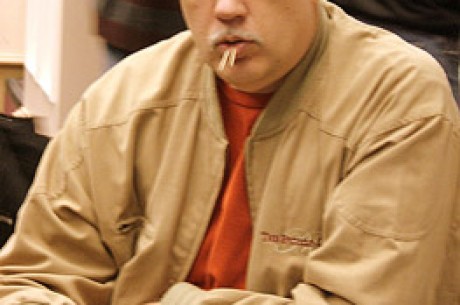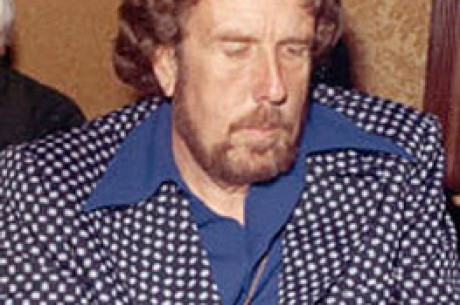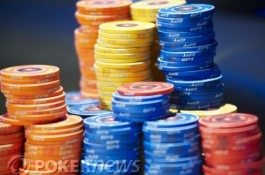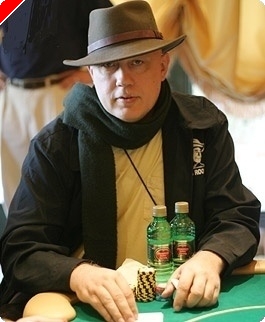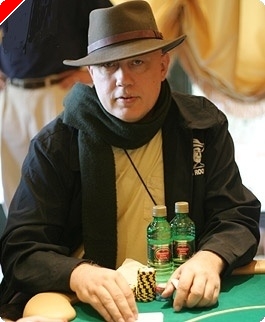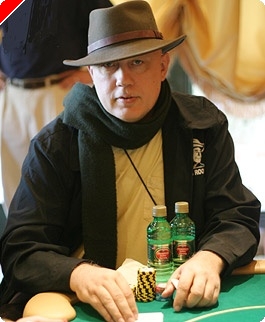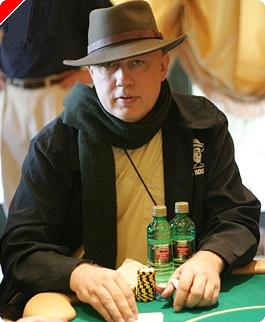Inside the Poker Tour 14 - From the WSOP
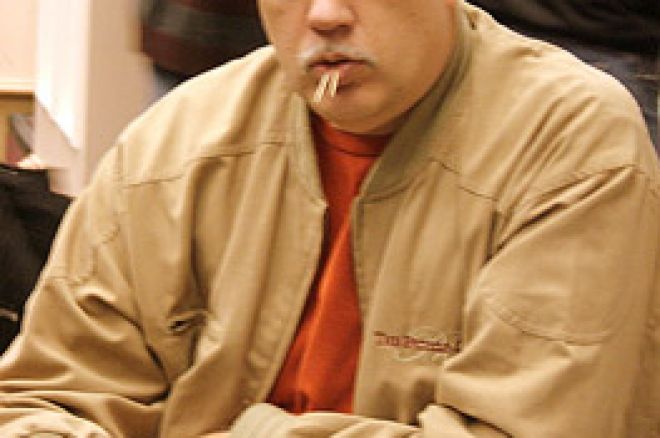
The ten thousand dollar Omaha pot-limit tournament at the 2005 WSOP had an interesting structure (I have seen it before, but perhaps some readers have not.).
You were given five thousand in chips originally and at any time in the first three levels that you wished you are given five thousand more in chips, for nothing! Similar structures often have a token or small buy-in for the one optional re-buy (such as 1000 for your first five thousand in chips and fifty more dollars for your second five thousand at any time that you wish?in effect everyone will spend 1050 and get 10,000 total in chips), it is clear to me that this was done in an effort to please the pot-limit Omaha players who fear getting knocked out with one dollop of chips to compete with. 165 players began this event on July 2 and some of them added the optional chips to their stacks right away. Is this the correct strategy? Well it depends on your style but I do not think it is very often right, although many will argue that it is! The players that favor adding on right away are those that think they rate to have the better hand when all the money goes in?but wait this is Omaha where draws abound, and are even favored at times.
The segue here is to a featured hand that came up in the 10,000 buy-in pot-limit event at this WSOP. It is late in the event, although not at the money yet (they paid 18 spots), and two of the leaders (Barry Greenstein and Simon Trumper) go head to head in the following hand, which has raised an important ethical issue for debate amongst the professionals here. Barry holds KsJsJc10c and Simon As8s10d8d and Barry raises on the button, the flop comes QsJh6s with 5000 in the pot and Barry bets 4500 with Simon calling. The turn comes the Ace of clubs and Barry now has the "nuts" with the best possible straight made, a set, and the second highest possible flush draw. He bets the pot which is now 14,000, Simon thinks for a long time and this is considered acceptable by most of us because he has a lot to think about?a King or a nine might be a winner and the spades that do not pair the board are the nuts, on top of which he has the top pair?is it possible that the pair of Aces alone are good? Simon could throw the hand away and still be in a good position in the tournament chip-wise but he likely knows that Barry might have a better hand, and also might be 'smelling weakness' and trying to blow him off a winner with the thought that Simon will only risk his chips in this spot with a very strong hand. After long thought Simon calls.
Now let me mention a few other relevant things. Barry had not played with Simon before and did not yet have a complete read on him. I have played no-limit holdem at previous WSOP's with Simon and he makes my "human rain-delay" team, which is not a good thing, because he is a tough European professional that knows where he is at in most hands, and further, knows what his own action is likely to be. For beginners long thinks are more natural because they do not know where they are at in hands, but for professionals in most situations they should act within 15 seconds. I typically know what I am going to do within a small fraction of one second and have to force myself to always take 3 seconds or so for every decision so that I create something of a natural field for all my actions.
On the internet it has become a "cute" thing to do to wait a very long while to bet or raise or check-raise with the best possible hand. Now while this may be something of a tell it does have some advantages in that their opponents get impatient waiting and just out of curiosity alone may call. The ethical question is how acceptable is how long of a wait? Getting more hands out per each time frame is certainly to the better players favor. How much deception value does one get by long waits and delays? How about a player that is capable of realizing that no possible hand beats his hand? Sometimes in big-bet poker there will be another question for him to answer, and that is how much can he bet and still get paid off, or exactly what is the correct and exact amount that he should bet?
Okay, back to our featured hand. The river brings the 2 of spades giving Simon the nut flush (Ace high flush without any possible redraws or actual hands that can beat it.). Simon checks and Barry bets 14,500, leaving him-self only 9000 more in chips. If Simon were to check-raise in this spot can Barry lay his hand down and continue as a short stack while holding the second best possible hand? Perhaps, but it would be very difficult as the pot is enormous and will the final 9000 that Barry has in front of him will find a better spot? What if Simon holds something like Ace of Spades, 6 of Hearts, 6 of Diamonds, King of Hearts? Or AsAh10h8h? If Simon does hold the Ace of Spades in this spot is he capable of making this play and representing the nut flush?
In the real world Simon now goes into a torturously long think which was reported to me by three other witnesses, including two other players at the table, to be of more than five minutes in duration. During this 'nap' several players wandered away from the table and watched the action at nearby tables. They were giving Simon a lot of space and courtesy, but what was he giving them? A hard time at best and bad acting at worst. Perhaps he was expecting someone at the table to call "time" on him, and force him to act in one minute? To Barry's credit (and his unquestioned sense of fair play) he suggested that I go get Simon's side of the story but as I have received an account of this hand from at least two other players at the table I would only do so if it were convenient. At long last, after six minutes or so, he raises. It makes no sense at all for him to raise at this point unless he holds the best possible hand but Barry told me that he called now just to certify the fact that his opponent had been masturbating before the whole table.
I do not condone Simon's behavior in this matter. His first long think (on the turn) I can accept. Thinking as deception for a minute on the river I have no real problem with. Let me say that I find his second consecutive long long long think totally unacceptable at any level, and most especially at this level. Even if I do not like my opponent as a person I would not do this to them. It is spiteful and uncalled for.
Barry apparently did not shake this one off easily either as he returned the next day and seeking Simon out told him, "You should not be allowed to play in any tournaments in the future!" This is a scathing indictment from the usually mild mannered Barry.
Let me also clearly put forth the idea that something needs to be done about this (not to Simon as he was acting within the acceptable limits of existing rules). The rules need to be changed and unfortunately it is always an abuse of the existing rules that leads to such needs. I do not have a suggestion at this moment but one cannot be allowed an indefinite amount of time to act in any situation. The person who calls for a clock in these situations is often singled out as the 'bad' guy at the table and that is not right either.
Play good....and get lucky!
Ed Note: Lots of new players playing at London Poker Club Join the club today.

